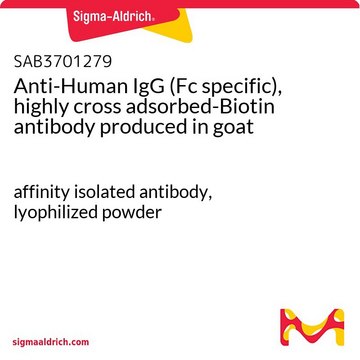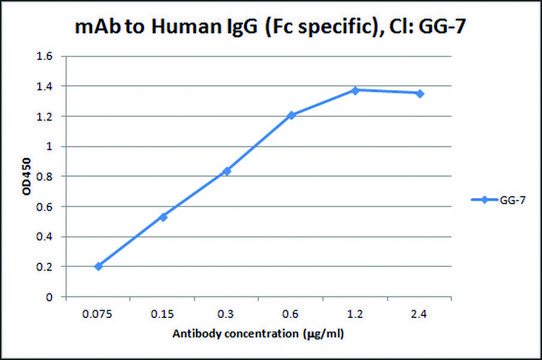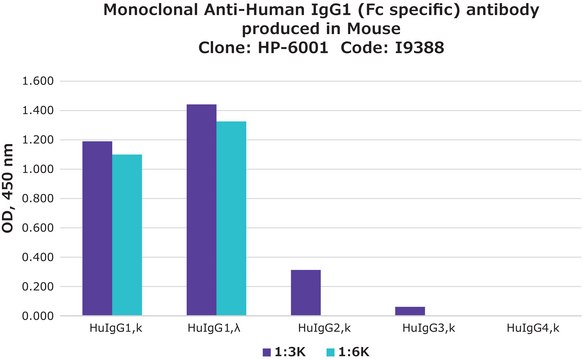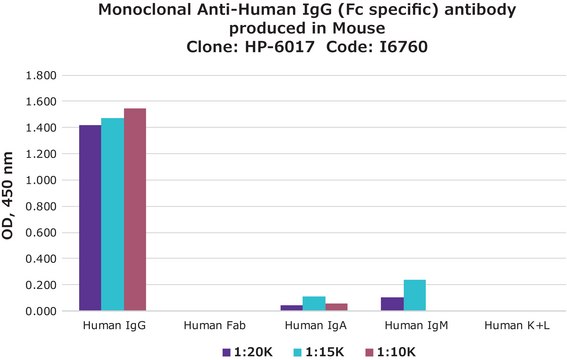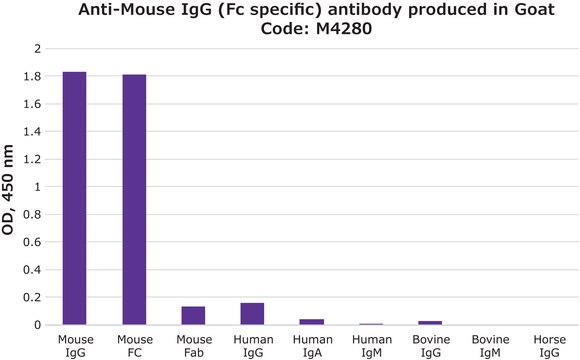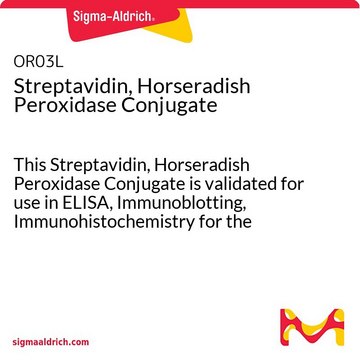B3773
Anti-Human IgG (Fc specific)−Biotin antibody, Mouse monoclonal
clone HP-6017, purified from hybridoma cell culture
Synonym(s):
Monoclonal Anti-Human IgG (Fc specific)
Sign Into View Organizational & Contract Pricing
All Photos(2)
About This Item
UNSPSC Code:
12352203
NACRES:
NA.46
Recommended Products
biological source
mouse
Quality Level
conjugate
biotin conjugate
antibody form
purified immunoglobulin
antibody product type
secondary antibodies
clone
HP-6017, monoclonal
form
buffered aqueous solution
species reactivity
rabbit, sheep, horse (IgG), goat, human
technique(s)
direct ELISA: 1:80,000
isotype
IgG2a
shipped in
dry ice
storage temp.
−20°C
target post-translational modification
unmodified
Looking for similar products? Visit Product Comparison Guide
Related Categories
General description
Immunoglobulin IgG is an abundant protein in human serum. The four classes of IgG include IgG1, IgG2, IgG3 and IgG4.. The IgG heavy chain region is mapped to human chromosome 14. Immunoglobulin super-family have a common structure, comprising of two heavy (H) chains and two light (L) chains, held together by disulfide linkages. The heavy chain has one variable N-terminal region and three to four constant (CH1-CH4) C-terminal regions. The L chain comprises of one variable N-terminal region and a constant C-terminal region.
Specificity
The antibody is specific for the Fc portion of human IgG and recognizes an epitope common to all human IgG subclasses. This antibody was adopted as an Fc specific reagent in the IUIS/WHO study.
Application
Anti-Human IgG (Fc specific) Biotin antibody, Mouse monoclonal has been used in fluoroimmunoassay of plasma samples.
Applications in which this antibody has been used successfully, and the associated peer-reviewed papers, are given below.
Enzyme-linked immunosorbent assay (1 paper)
Enzyme-linked immunosorbent assay (1 paper)
Monoclonal Anti-Human IgG (Fc specific)-Biotin antibody produced in mouse is suitable for ELISA at a working dilution of 1:80,000. It was used for labeling mouse splenocytes and analysis by flow cytometry.
Biochem/physiol Actions
IgG antibody subtype is the most abundant of serum immunoglobulins of the immune system. It is secreted by B cells and is found in blood and extracellular fluids and provides protection from infections caused by bacteria, fungi and viruses. Maternal IgG is transferred to fetus through the placenta that is vital for immune defense of the neonate against infections. The coupling of biotin to monoclonal Anti-Human IgG (Fc specific) antibody allows for the binding of various labels such as avidin or streptavidin.
IgG1 class is the most abundant and its deficiency results in hypogammaglobulinemia. IgG2 deficiency increases susceptibility to bacterial infections. IgG3 mediates effector functions, and IgG4 is associated with asymptomatic infection. Digestion of IgG by papain results in the generation of fragment antigen binding (Fab). Pepsin digestion of IgG generates fragment crystallisable (Fc). The Fc region of IgG antibody has enormous therapeutic potential and is exploited for the development of therapeutic antibodies.
Physical form
Solution in 0.01 M phosphate buffered saline, pH 7.4, containing 1% bovine serum albumin and 15 mM sodium azide
Disclaimer
Unless otherwise stated in our catalog or other company documentation accompanying the product(s), our products are intended for research use only and are not to be used for any other purpose, which includes but is not limited to, unauthorized commercial uses, in vitro diagnostic uses, ex vivo or in vivo therapeutic uses or any type of consumption or application to humans or animals.
Not finding the right product?
Try our Product Selector Tool.
Storage Class Code
12 - Non Combustible Liquids
WGK
WGK 2
Flash Point(F)
Not applicable
Flash Point(C)
Not applicable
Choose from one of the most recent versions:
Already Own This Product?
Find documentation for the products that you have recently purchased in the Document Library.
Customers Also Viewed
Our team of scientists has experience in all areas of research including Life Science, Material Science, Chemical Synthesis, Chromatography, Analytical and many others.
Contact Technical Service




